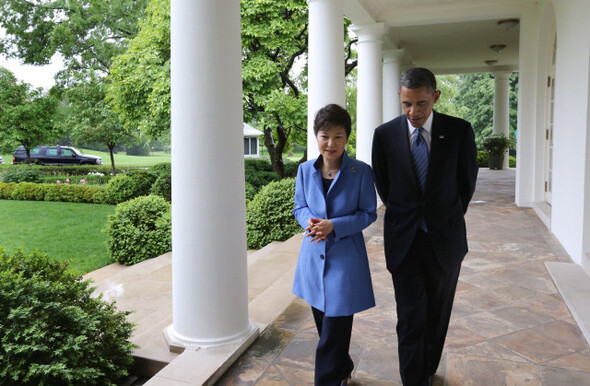hankyoreh
Links to other country sites 다른 나라 사이트 링크
Park and Obama avoid direct comments on US missile defense system

By Gil Yun-hyung, Kim Kyu-won and Cho Hye-jeong, staff reporters
The apparently friendly summit between South Korean President Park Geun-hye and US President Barack Obama on May 7 had just one small fly in the ointment: a difference in views on the missile defense system that Washington is currently pushing.
Speaking at a press conference after the summit, Obama said the two sides were “we’re investing in the shared capabilities and technologies and missile defenses that allow our forces to operate and succeed together.”
The remark seems to suggest that Seoul had agreed to full-on participation in US-style missile defense. But Park, rather than agreeing to or echoing the sentiment, never mentioned it.
In the two leaders’ joint statement, the difference in views was patched over with vague wording about South Korea and the US being, “resolved to continue to defend our citizens against North Korea’s provocations by strengthening our comprehensive, interoperable, and combined defense capabilities, to include shared efforts to counter the missile threat posed by North Korea and integrated intelligence, surveillance, and reconnaissance systems.” This appeared to reflect a compromise, in which Washington and Seoul agreed on an ambiguous text that included no reference to missile defense, but sounded as though it might be referring to it.
The missile defense project has been under way since the administration of Obama’s predecessor George W. Bush. It involves responding to the North Korean nuclear threat by detecting launches, tracking their trajectory, and intercepting them. Neighboring Japan surprised many with its December 2005 decision to participate - a decision apparently informed by the jolting experience of having North Korea’s Taepodong-1 pass through its airspace in June 1998. Seoul has been under pressure from Washington to participate since the Kim Dae-jung presidency (1998-2003), but leaders have rejected the idea as unsuited to the country’s national security situation and too likely to provoke Beijing.
Indeed, while missile defense is a core part of the Obama administration’s “pivot to Asia,” China has objected to it as part of a strategy to “encircle” it and neutralize its own missile deterrence.
The Ministry of National Defense shrugged off Obama’s remarks on May 7, saying South Korea had “nothing to gain from participating” in missile defense. Indeed, its proximity to North Korea means that any short-range ballistic missiles launched from there would be almost impossible to shoot down.
But if South Korea does take part, it would necessarily mean intercepting any North Korean Rodong missiles (with firing ranges of 1,300 km) targeting Japan, or any Musudan missiles (with firing ranges of 3,500 km) capable of striking US targets in Guam. In other words, South Korea would face a greater expense and national security burden with few real benefits.
A Blue House official said it “makes no sense” for South Korea to participate “because it’s a system we have no way of using ourselves.”
“We have our own Korean Air and Missile Defense (KAMD) system, which is suited to our situation,” the official explained.
But as the North Korean missile threat comes into greater focus, South Korea and the US have continuously made the references to missile defense in various joint statements more and more clear. A statement made after their October 2011 summit included only abstract wording, but the latest one - made after North Korea’s successful launch of the Unha-3 in December - was much more concrete.
“President Park did not respond to [Obama’s remarks], and it wasn’t included in the joint statement,” said Yonsei University professor Moon Chung-in. “That was a good decision on her part. We have a relationship with China, and we need to delicately and respectfully avoid even discussing the topic.”
Please direct questions or comments to [english@hani.co.kr]

Editorial・opinion
![[Column] Season 2 of special prosecutor probe may be coming to Korea soon [Column] Season 2 of special prosecutor probe may be coming to Korea soon](https://flexible.img.hani.co.kr/flexible/normal/500/300/imgdb/original/2024/0426/3317141030699447.jpg) [Column] Season 2 of special prosecutor probe may be coming to Korea soon
[Column] Season 2 of special prosecutor probe may be coming to Korea soon![[Column] Park Geun-hye déjà vu in Yoon Suk-yeol [Column] Park Geun-hye déjà vu in Yoon Suk-yeol](https://flexible.img.hani.co.kr/flexible/normal/500/300/imgdb/original/2024/0424/651713945113788.jpg) [Column] Park Geun-hye déjà vu in Yoon Suk-yeol
[Column] Park Geun-hye déjà vu in Yoon Suk-yeol- [Editorial] New weight of N. Korea’s nuclear threats makes dialogue all the more urgent
- [Guest essay] The real reason Korea’s new right wants to dub Rhee a founding father
- [Column] ‘Choson’: Is it time we start referring to N. Korea in its own terms?
- [Editorial] Japan’s rewriting of history with Korea has gone too far
- [Column] The president’s questionable capacity for dialogue
- [Column] Are chaebol firms just pizza pies for families to divvy up as they please?
- [Column] Has Korea, too, crossed the Rubicon on China?
- [Correspondent’s column] In Japan’s alliance with US, echoes of its past alliances with UK
Most viewed articles
- 1[Column] Season 2 of special prosecutor probe may be coming to Korea soon
- 2‘We must say no’: Seoul defense chief on Korean, USFK involvement in hypothetical Taiwan crisis
- 3Division commander ordered troops to enter raging flood waters before Marine died, survivor says
- 4Is N. Korea threatening to test nukes in response to possible new US-led sanctions body?
- 5Is Japan about to snatch control of Line messenger from Korea’s Naver?
- 6No good, very bad game for Korea puts it out of Olympics for first time since 1988
- 7[Editorial] Korea’s surprise Q1 growth requires objective assessment, not blind fanfare
- 8Korea’s 1.3% growth in Q1 signals ‘textbook’ return to growth, says government
- 9N. Korean delegation’s trip to Iran shows how Pyongyang is leveraging ties with Moscow
- 10Amnesty notes ‘erosion’ of freedom of expression in Korea in annual human rights report